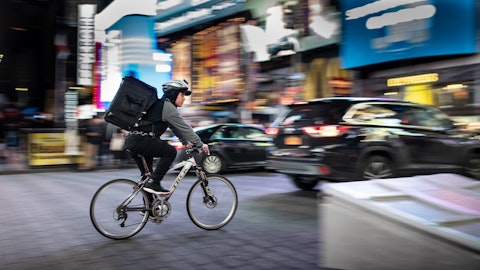Russell Weiner: Yes, thanks Sarah, it’s a great question. I think what I’ll do is take a little step back and just give perspective on our business. As you said, it’s a unique one. 60% of our sales are delivering. When we talked in our comments about the QSR delivery category down, the pizza delivery category was down, Dominos actually gained shared. So it’s not the prettiest way to gain share, but in a macroeconomic time where the entire delivery QSR category is pressured, we grew sharing in the pizza category. That’s 60% of our business, and when that’s 60% of your business, you’re going to see the numbers fall out the way they did. Now, what I’d like to think about when I talk about the Sara Senatore from Bank of America and future Dominos is how much more diverse we are than we were years ago.
So think about our Carryout business that’s not encumbered by any of those headwinds was up 14% to 15% in Q4, over 30% over the last three years, $1 billion dollars over the last three years, you know that’s really a business that’s on fire, and then internationally we open more organic stores than we ever had in our history. And so I think you just need to have that perspective of looking at our entire business, how we’re performing in delivery, how that performance is actually making us better, so when we come out of this we’re going to be a better delivery company, but how the more complete dominoes is in a better place as we head through these tougher times. So if I were to take that as a backdrop to your second question on you know aggregated for delivery, again like I said, we’re continuing to grow share of delivery pizza here.
We do work with aggregators globally. We’ve got $1 billion in sales outside of the U.S. where we’re learning every day, and while we do that we’re doing things like continuing to improve our ordering experience and improving the loyalty program as I spoke about, to make sure our delivery ordering experience is better than everybody else’s.
Operator: Thank you. One moment for our next question. And our next question comes from the line of Jeffrey Farmer from Gordon Haskett. Your question, please.
Jeffrey Farmer : Good morning. You guys stated that you’re proud of the work that you’ve done with franchisees to address labor constraints and delivery business. Can you just elaborate on what you’ve done there to sort of shore up some of the driver need? And do you believe that staffing shortfalls are no longer having a material impact on your relative same store sales performance?
Russell Weiner: Yes, thanks for the question. Look, we’re satisfied with the improvement. We’re never going to be satisfied until every delivery is there as expeditiously as we can get it. So we’re satisfied, but what I’d say is we have more work to do, so our service times are better. They are not better than they were in 2019 and that’s the place we need to go. When you look at our corporate stores, it’s trying to think about that as a proxy for what’s going on in the rest of the business. Corporate stores, our hires are at pre pandemic levels now, turnover is down, job applications are up and we’re getting people through the system faster on applications. We talked about call centers. I wouldn’t really mention it on this call, but about half our stores are on call centers right now.





